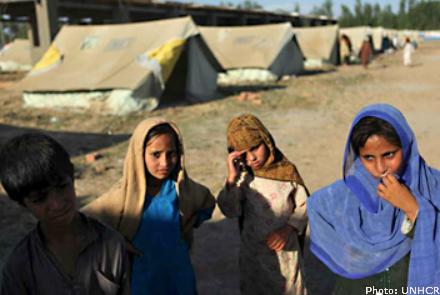Pakistan has taken in Afghan refugees since the 1970s and until today, there is an estimated two million Afghan refugees living in Pakistan.
However, last year, Pakistan tightened its refugee policy and since then the UNHCR estimates close to 400,000 Afghans have been repatriated, the Associated Press reported.
Of the two million refugees in Pakistan, the UNHCR says many have lived in the country for about 30 years.
One refugee, is Salam Uwaah, who is preparing to depart after having stayed at a refugee camp for the past 27 years, the Associated Press reported.
He is returning to Afghanistan with all his 11 family members.
"Living conditions were good at the place we used to live, and there were also good job opportunities. But now it is different. Our place will be demolished soon," said Uwaah, who teaches at the refugee camp.
AP reported that some return refugees decided to pack up after border crossing issues increased.
"We have many difficulties in border-crossing due to the new visa policy. It used to be very convenient for our relatives in Afghanistan to visit us here, but now the procedures are very complicated. So we decide to go back to Afghanistan," said Fanagu, another refugee.
According to UN staff manning a Peshawar repatriation center, repatriation allowances are being cut from $400 USD down to $200 USD per person due to shrinking international donations.
Oscar Mundia, head of the UNHCR Sub-Office at Peshawar said: "Big challenge is of course ensuring their properly assimilating back into the system, having been welcomed in Pakistan for such a long period of time. So once people spent so many years in displacement away from their country, it is always difficult for them to restart their life upon return."
Tuesday was World Refugee Day and in a statement to mark the event, UN High Commissioner for Refugees, Filippo Grandi said: “We honor the resilience and courage of more than 65 million people who have been forced to flee war, persecution and violence.
“But it’s also a moment to recognize those communities and people around the world who receive refugees and the internally displaced in their midst, offering them a safe place, and welcoming them in their schools, their workplaces and their societies,” he said.
He said that through UNHCR’s work – often on the front lines of conflict – “we witness the courage, tenacity and brilliance of refugees every single day. Having lost their homes, their work, and sometimes their families - they don’t give up - they find a way to start again.”
“So on World Refugee Day, when we pause to contemplate the fate of the millions of people who cannot return to their homes tonight because of war or persecution – it’s also a moment to ask ourselves what each of us can do to overcome indifference or fear and embrace the idea of inclusion, to welcome refugees to our own communities, and to counter narratives that would seek to exclude and marginalize refugees and other uprooted people,” he said.


Comment this post